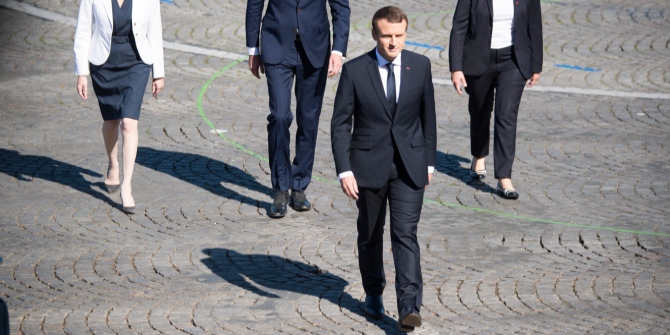 Last year, Italy’s populist government under Silvio Berlusconi was replaced by a technocratic one with no electoral mandate under new Prime Minister Mario Monti. Duncan McDonnell argues that opposition to Italy’s technocratic government means that anti-establishment parties like the Lega Nord and Beppe Grillo’s 5-Star Movement will continue to expose the organisational and ideological frailties of mainstream parties.
Last year, Italy’s populist government under Silvio Berlusconi was replaced by a technocratic one with no electoral mandate under new Prime Minister Mario Monti. Duncan McDonnell argues that opposition to Italy’s technocratic government means that anti-establishment parties like the Lega Nord and Beppe Grillo’s 5-Star Movement will continue to expose the organisational and ideological frailties of mainstream parties.
If you were to try and design a populist’s nightmare government, it might look something like this: a cabinet without a single party representative, composed mostly of academics and senior civil servants; imposed under pressure from the European Union and the financial markets; no electoral mandate for its 18-month term; charged with introducing spending cuts and tax hikes; supported in parliament by an unprecedented coalition of the main parties of centre-right, centre-left and the centre.

And the prime minister? Before taking office, he was president of the private Bocconi University in Milan and European Chairman of the Trilateral Commission. Previously, he had been an international advisor to Goldman Sachs and on the Senior European Advisory Council of the ratings agency Moody’s. Before all that, he served for 10 years as a European Commissioner. Welcome to Mario Monti’s technocratic government. Welcome to Italian Politics in 2012.
Of course, in reality, the above is also a populist challenger’s dream government: it offers ample opportunities to claim (justifiably) that the main parties have collectively abandoned the responsibilities of both government and opposition and handed the running of the country over to unelected domestic and international elites.

It is no surprise therefore that the most vociferous opponents of the Monti government are the Lega Nord (LN – Northern League) and Beppe Grillo’s Movimento 5 Stelle (M5S – 5-Star Movement), both of which espouse a strong anti-establishment discourse and invoke returning democracy to the people. However, the fortunes of these two movements have been very different over the past year. While the M5S enjoyed unexpectedly good results in the 2012 local elections and saw its support in opinion polls surge from circa 5 per cent in April to around 20 per cent in the summer, the Lega has had to deal with its enforced departure from coalition government last November, the end of its alliance with Silvio Berlusconi’s Popolo della Libertà (PDL – People of Freedom), and, finally, an expenses scandal which led to the resignation in April 2012 of its founder and leader, Umberto Bossi.
Although many in the Italian media were quick to proclaim the terminal decline of the Lega under the combined weight of Bossi’s departure, internal disputes and opinion polls which put its support at 5 per cent, down from over 10 per cent just two years ago, it would be extremely foolish to write the party off.
First of all, despite the often trotted-out line about charismatic leaders being irreplaceable, there is no reason to think that Bossi’s resignation in itself will have an adverse electoral impact on the Lega. Quite the opposite is possible in fact: his replacement, Roberto Maroni, was consistently the most popular minister in the PDL-Lega government from 2008-2011 and, crucially, so far seems to be uniting the movement behind him.
Second, the Lega is not a party (like the PDL) whose lifespan depends on its founder. As Daniele Albertazzi and I showed in a 2010 article in West European Politics, it has a clear ideology, a distinct policy offer, a growing membership and a well-structured and active party organisation.
Third, while the expenses scandal and Bossi’s involvement in it certainly have weakened the party’s self-portrayal as ‘different’ from the other parties, the Lega was quick to deal with the problem: heads rolled, including that of the founder-leader. It would be hard to imagine any of the other Italian parties acting so decisively.
Finally, despite the LN’s current estrangement from the PDL, it is quite probable – given the bipolar logic enforced by Italian electoral systems at both national and subnational levels – that a rapprochement between the two will be engineered in time for the 2013 general election.
As for Grillo’s movement, it too has come under sustained attack in the Italian media which has tended to dismiss it as ‘anti-political’. However, this is far too simplistic. While the M5S is certainly ‘anti’ the main parties, ‘anti’ the Monti government and ‘anti’ austerity, it is not anti-politics per se. Nor is it a flash-in-the-pan movement. In fact, Grillo’s meet-ups and then the M5S have been active for at least five years at grassroots level in campaigns ranging from sustainable development to political transparency to utility privatisations.
The M5S is not saying that politics is a dirty world which voters should keep at arm’s length by voting for it. Rather, it is saying that citizens themselves should become more involved in scrutinising and shaping decisions. It is true that it attracts a certain protest vote and it seems highly unlikely that its current poll ratings could be reproduced in a general election. Nonetheless, it is not going to politely fade away once the 2013 campaign begins.
The M5S will be a force to be reckoned with and those on the centre-left would do well to start considering it more seriously than they have done so far, not only because of the votes the M5S will take from the leading centre-left party (Partito Democratico, PD) and others on the Left, but also because of the grievances Grillo’s movement expresses. But that is unlikely to happen.
Rather, the PD leader, Pierluigi Bersani, seems to be adopting the tactic of doing as little as possible now that his party is in first place in the polls, with ratings around 25 per cent. Of course, that will not be enough for the PD to win on its own. And, at less than 9 months from the general election, we still do not know for sure whom the party will ally with, who the leader of that coalition might be, how he/she will be chosen, and, as ever, the chronic problem for the PD since its foundation: what are its key policies and what does it stand for? Count on its opponents, populists included, being better organised and certainly better at communicating as we approach the campaign. They usually are.
This article first appeared at Policy Network.
Please read our comments policy before commenting.
Note: This article gives the views of the author, and not the position of EUROPP – European Politics and Policy, nor of the London School of Economics.
Shortened URL for this post: http://bit.ly/Ry04EU
_______________________________
 Duncan McDonnell – European University Institute, Florence
Duncan McDonnell – European University Institute, Florence
Duncan McDonnell is Marie Curie Fellow in the Department of Political and Social Sciences at the European University Institute in Florence. He is the co-editor of Twenty-First Century Populism (Palgrave, 2008) and has recently published on the Lega Nord and Outsider Parties. He has also recently co-edited the 2012 ‘Politica in Italia/Italian Politics’ yearbook, published in Italian and English by Il Mulino and Berghahn. He is currently working with Daniele Albertazzi on a book entitled ‘Populists in Power’ which will be published by Routledge.




